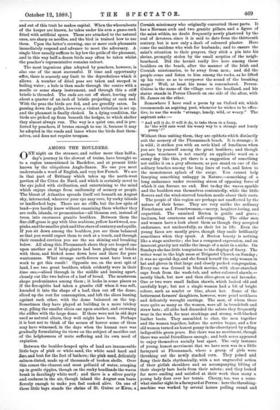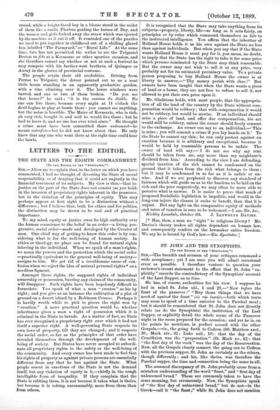AMONG THE BOULDERS.
ONE night on the steamer, and rather more than half-a_ day's journey in the slowest of trains, have brought us to a region unmentioned in Baedeker, and at present little mown by the nbiquitons Anglo-Saxon. No one you meet 'understands a word of English, and very few French. We are in that part of Brittany which takes up the north-west portion of the Cotes du Nerd, and which is certainly novel to the eye jaded with civilisation, and entertaining to the mind which enjoys change from uniformity of scenery or people. The bluest of Atlantics spreads itself out beneath an August sky, intersected, wherever your eye may rove, by rocky islands or landlocked bays. There are no cliffs, but the low spits of land—you hardly know without examining them whether they -are reefs, islands, or promontories—all blossom out, instead of trees, into enormous granite boulders. Between them the fine cliff-grass is gay with blue scabious, yellow hawkweed, sea- -pink s, and the smaller pink and blue stars of centaury and squills. If you sit down among the boulders, you see them balanced so that you would expect them to rock at a touch, and through their rounded crevices you see the sea shining and breaking below. All along this Ploumanach shore they are heaped one -upon another as if baby-giants had been playing at bricks with them, and kicked some down here and there for pure wantonness. What strange earth-forces must have been at work to get this result ! Opposite me, on the next spit of land, I see two great boulders, which evidently were in their time one,—sliced through in the middle and leaning apart, cleanly cut like two halves of a loaf of bread. The mushroom shape predominates among them ; it looks in some places as if the fire-spirits had taken a granite cliff when it was soft, _kneaded it into the shape of a loaf, then cut off the dome, -sliced up the rest for consumption, and left the slices leaning
,against each other, with the dome balanced on the top. Sometimes they have played at building in a more tricksy way, piling the smaller slices one upon another, and crowning .the edifice with the large dome. If these were not in old days used as natural altars, they well might have been. Perhaps it is best not to think of the scenes of horror some of them may have witnessed, in the days when the human race was gradually formulating its views on the subject of sacrifice out of the helplessness of mute suffering and its own need of -expiation.
Between the boulder-heaped spits of land are innumerable little bays of pink or white sand, the white sand hard and .fine, and beat for the feet of bathers; the pink sand, delicately salmon-tinted, made up of thousands of broken shells. Over this comes the clearest and most pellucid of water, creeping alp in gentle ripples, though on the rocky headlands the waves -break in dazzlingly white surf ; and there is a silver purity and coolness in the air, though inland the August sun beats fiercely enough to make you feel cooked alive. On one of these little bays stands the shrine of St. Guirec or Sirec, a
Cornish missionary who originally converted these parts. It has a Norman arch and two granite pillars, and a figure of
the saint within, no doubt frequently newly plastered by the zeal of devotees, since it is said to date from the thirteenth century, but is now only a daub of coloured plaster. Here come the maidens who wish for husbands; and to ensure the saint's attention to their prayers, they stick a pin into his shrine, promptly stolen by the small sceptics of the neigh- bourhood. Did the hermit really live here among these boulders on the beach, after the manner of the Irish and Cornish missionaries, to be away from men; and did the people come and listen to him among the rocks, as he lifted up his voice so as to overpower the sound of the breaking surge ? Well, at least his name is remembered. Perms- Gnirec is the name of the village over the headland, and his statue stands in Perros Church on one side of the altar, with St. James on the other.
Somewhere I have read a poem by an Oxford wit, which recommends an aspiring poet, whenever he wishes to be effec- tive, to use the words "strange, lonely, wild, or weary." The aspirant asks :— "And will it do, 0 will it do, to take them in a lump, As the wild man went his weary way to a strange and lonely pump' ?"
Without thus uniting them, they are epithets which distinctly suit the scenery of the Ploumanach beach. It-is strange ; it is wild ; it strikes you with an eerie kind of loneliness when you are by yourself among the great boulders ; and though perhaps weariness is not exactly an applicable word on a sunny day like this, yet there is a suggestion of something not unlike it on a grey afternoon, as you stand on one of the solitary beaches among the long lines of rock, and listen to the monotonous splash of the surge. You cannot help fancying something unhappy in Nature,—something of a long endurance under recurring stress of opposing force of which it can foresee no end. Bat to-day the waves sparkle and the boulders sun themselves contentedly, while the little flowers and the wind-starved bracken nestle about their roots.
The people of this region are perhaps not unaffected by the nature of their home. They are very unlike the ordinary Frenchman and Frenchwoman,—merry, laughter-loving, and coquettish. The unmixed Breton is gentle and grave ; taciturn, but courteous and self-respecting. The older men and women have a look about them as though they accepted endurance, not uncheerfully, as their lot in life. Even the young faces are mostly grave, though they smile brilliantly sometimes when they speak. A Breton beauty is nothing like a stage soubrette ; she has a composed expression, and an innocent gravity not unlike the image of a saint in a niche. On Sundays she has little temptation to the display of finery. The writer went to the high mass at Tregastel Church on Sunday ; it was no special day, and she found herself the only woman in hat and gloves in that large and closely packed congregation. Every one was dressed in black merino, with clear-starched caps fresh from the wash-tub, and sober-coloured shawls,— mostly black, but now and then olive-green or sad lavender. One or two wore small Indian shawls, which looked old and carefully kept; but not a single woman had a bit of bright colour, such as scarlet or blue, about her. Some of the bettermost farmers' daughters, however, wore pearl necklaces and delicately wrought earrings. The men, of whom there were quite as many as the women, were all in broadcloth and straw hats ; all alike had discarded the sabots they frequently wear in the week, for neat stockings and strong, well-blacked leather boots. They assembled to chat, the men together and the women together, before the service began, and a few ' old women turned an honest penny in the churchyard by selling indigestible green pears. But there was no merriment, though there was social friendliness enough ; and both sexes appeared to enjoy themselves socially best apart. The only instance of young, honest merriment that we have seen was in a little farmyard at Plonmanach, where a group of girls were threshing out the newly stacked corn. They poised and flung their flails rhythmically, with a not ungraceful action of their girlish shoulders and an accompanying lifting of their shapely bare heels from their sabots ; and they looked far more smiling and satisfied at their work than many a young lady does over her tennis. Cheery, too, was a some- what similar sight in a farmyard at Perros : here the threshing- machine was worked by several horses pulling round and
round, while a bright-faced boy in a blouse stood in the midst of them like a rustic Phoebus guiding the horses of Day, and the women and girls forked away the straw which was ejected by the machine as it cut it off. It reminded one of the puzzles we used to put together in childhood out of a shilling glazed box, labelled "The Farmyard," or "Rural Life." At the same time, fate has not permitted the writer to see the Tregastel Breton en fete at a Kermesse or other sportive occasion, and she therefore cannot say whether or not at such a festival he may compete with his farther-west brethren of Quimper or Auray in the glories of provincial costume.
The people retain their old oredulities. Driving from Perros to Treguier, the driver pointed out to us a neat little house standing in an apparently productive garden, with a vine climbing over it. The lower windows were barred, and one or two of them broken. "Do you see that house?" he said ; "it is the maison du diable. No one can live there, because every night at 11 o'clock the devil begins to play at bowls there : you cannot see anything, but the noise is horrible. The Maire of Kermaria, who is rich, oh very rich, bought it, and said he would live there ; but he had to leave it, and no one has ever tried since." He thought a crime must have been committed there autrement—he meant autrefais—but he did not know about that. He only knew that any one who went there at the right time could hear the bowls.



















































 Previous page
Previous page